Lindsey Renee Backen's Blog, page 6
August 16, 2019
I Learned How I Think, and I Couldn't Wait to Share!
Dear Friend,
Two letters in a week? Yes, because I just finished figuring out the process I use to think and I am excited. In one way, it’s obvious! I feel as though if I had sat down and thought about it, I may have come up with it on my own. On the other hand, I have never figured it out before so this stuff really works. It's part of the Gift Profile Assessment from Dr. Leaf’s book, Think, Learn, Succeed. But here’s the thing. We process information super-fast. Dr. Leaf says steps 3, 4, and 5 of our thinking process are often below our conscious level. So while we can see the pattern while working with larger, more slow learning styles, they are also active in the split-second decisions and we may not realize we're using them at all.
I answered questions with “Yes” or “No” and refined them. Then I wrote long paragraphs about them, read the paragraphs to my friend Christy, and distilled it down into sentences. You know what? Those sentences described perfectly what I had just done with the quiz. If you take the quiz, you would probably do it differently than I did.
So, my friend, I present to you the Lindsey Way of thinking—presented in my own words and current understanding:
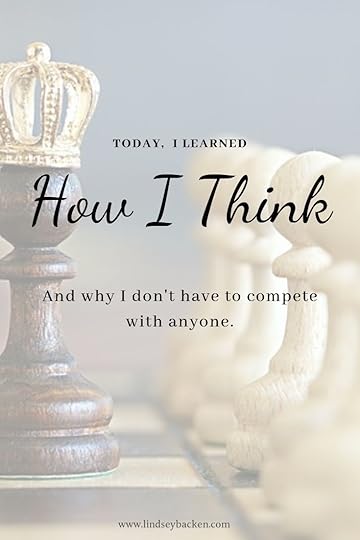
I analyze incoming information, organize it in my head, and make a plan.
I look for patterns, then consult my gut and conscience for whether a choice is right and worthy.
I visualize the choice, playing the plan or concept in my imagination and trying out different scenarios.
I write or talk about the idea, often bouncing it off of a friend. Often, I will develop and teach a class, which helps me make sure there aren’t gaps in my understanding and that I have grasped a complex concept well enough to break it into parts and reassemble it until someone else can understand it.
I then move into interacting with people, answering their questions. I find joy in seeing their eyes spark as they gain their own ideas and find ways to apply it to their unique circumstances.
I then step back into a more solitary mind space to quantify and organize both the results and the process, honing my ideas of how to approach and implement the idea.
Finally, I move into action, becoming hands-on and working in the physical aspects of the idea. This is how I came up with my life’s motto of “Bringing Stories to Life.”
That’s it, folks. And it makes so much sense in the way that I draft books, organize my theater events, or even answering a friend about going out for the night. We all use these modes of thinking but we all combine them in a different order and add our experiences and mindsets into them. This is why people think differently and why we sometimes have trouble understanding and relating to someone whose mind works differently.
You know what else it means? You ain’t dumb. Just because you weren’t strong in math as a kid, doesn’t mean you’re less intelligent than the A student you sat next to. (I can finally put the “Was I smart, average, or learning-disabled question to rest.) You processed information in a different order and when you learn and use this order, you are optimizing your uniqueness and working at your full-strength. And you’re not competing with anyone because no one in the world is going to think exactly the way you do, so you will always have something that only you can offer.
I am so excited this morning, that I had to share, even though I haven’t even finished reading Think, Learn, Succeed. This is my best and current understanding of the book, but I will be sharing even more once I have fully-grasped it. But this is life-changing stuff, so I wanted to encourage you to explore it for yourself without waiting on me! You can find out about this in Think, Learn, Succeed or explore Dr. Leaf’s concepts for free just by visiting her site. And just so you know, I am not affiliated with Dr. Leaf. I won’t make money on this link if you click it and I won’t even claim the above is exactly what she teaches. I am an average reader who learned something this morning. And I was too excited not to share.
I hope you are having a lovely day whatever you are doing today.
Lindsey
August 15, 2019
Overcoming the Fear of the "Right Choice"
Do you have a choice that you are scared to death of making? I do. A few of them, actually. After all, every choice we have made has gotten us to where we are now. And every choice is taking us to where we’ll be in the future. Sometimes, that thought is empowering: If I got myself here, I can get myself somewhere else. Other times, it’s overwhelming. “What if, what if, what if???”
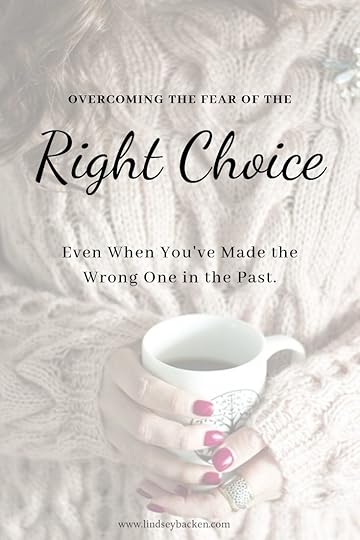
When I started LindseyBacken.com, I was bringing two sites together, combining my site for writers with my site for my readers. But now, like in life, I have so many options! What do I want to say? Where do I want to go with my life? If I tell you about one thing, am I going to confuse you when I start writing about a different topic? Yes, I am a writer and I love writing novels. I also love acting. Right now, I juggling publishing a novel with working a job, getting ready to direct a 1940’s dinner theater, and building an online buisness while simultaneously studying how the fifteen years of inflammation that I have lived with might actually have been caused by the signals given off by my phone and laptop. Do I write about those things? I’m so excited about some of them - and also scared.
Because with all our choices and goals comes doubt. How many things have you or I started in the past that just kind of—fizzled? Some felt like blowing embers of a dying fire and watching in dismay as the last spark goes, some felt like a blaze that got out of hand and left us burned. And scared. I mean, if you failed once at X, what makes you think you can do Y? Our thoughts can change our lives but they can also wreck havoc in them.
But stop. Let’s think about this. If you were a roaring success at everything you ever decided to try, you’d have a hard time making a go of anything. At least I would. I would live my life like a firefly, lighting up here, then darting over there to spark, then going another place. I could shine at everything, but I wouldn’t stick with anything. Trying things and deciding we don’t want to do them, or finding we’re really not cut out for them doesn’t mean we’re failures. We can modify it. We can scrap it and try another thing. You’re building a house: if you pick your boards at random, not every board will fit. Not every board even should.
When you are doing what you love, what you are best at, it’s not always going to be easy. But when things aren’t easy, you are forced to evaluate if they are worth it. When we find that thing that is worth the discomfort required to learn and grow it, we know it is part of our true selves.
So whatever your doing tonight, keep on. Or stop. Do that thing you know in your heart of hearts that you were meant to do. Don’t know what it is? Neither do I - exactly. But we’ll find it together. I believe in you.
Love,
Lindsey
August 8, 2019
Change Your Mind, Change Your Life
Dear Friend,
Mindsets. We all have them. Lately, I’ve realized mine have become increasingly scattered. My entire life feels scattered, from which step to do next for various projects, to bouncing back and forth on choices about my future, to trying to balance work, friendships, and health. This is a problem because mindsets are everything.
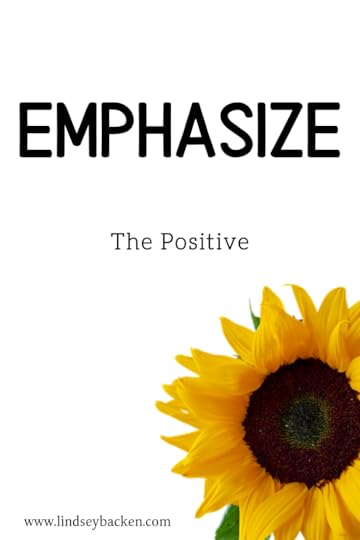
What exactly is a mindset? Dr. Caroline Leaf has a good definition in her book Think, Learn, Succeed. On page 37, she says “A mindset is an attitude, or a cluster of thoughts with attached information and emotions that generate a particular perception. They shape how you see and interact with the world.”
I have found it helpful to consider a mindset like a coin with a positive side and a negative side and both are very real things. Often, what we fear has an element of truth to it: if you get into a car, you could be injured in a car accident. Likewise, if you get into a car, you may end up safely at your destination. We cannot accuse you of making up the element of danger or even using irrational logic to conclude that you could be hurt on a trip to the grocery store.
But what if you went through life with the mindset that if you seat yourself in a vehicle, you will come to ruin? Sure, you could live without a vehicle, choosing to walk everywhere, scurrying across roads with fearful glances, and even lobbying that cars should be outlawed because of their potential to cause injury. You wouldn’t even be completely wrong in your assessment.
Or you could flip the coin. What if you believed that the chances of a safe trip were much greater than the chances of a catastrophe? What if you were brave enough to climb into the car and head off across the country to see a place you haven’t before? What if you drove yourself to interview that job you really want or picked up your date for a night out?
Developing a good mindset doesn’t mean that you are sitting with your eyes closed with your fingers in your ears, chanting happy mantras in hopes that your brain will start believing them if you repeat them enough times. But a good mindset is essential if you are to be and do everything that you have the potential and purpose for. And you do have purpose, my friend.
So how can we both develop a good mindset, while keeping ourselves grounded in reality?
Emphasize the positive.
I want to make a big poster that says this for my room. Did you know that science has shown that your thoughts impact your brain chemistry and all 75,000-100,000 trillion cells in your body? So it is vitally important that the thoughts we dwell on are the thoughts that we want to grow in our brain and influence our physical body and our actions. Emphasizing the positive doesn’t mean that we are ignoring the negative things in our lives or failing to take action when and where we need to. It means that we are focused on the things that are going right, and taking care of the things that are not so that they do. It means finding the blessings and bright spots even on days when our lives feel like they are going wrong. It means forgiving and moving on, rather than staying angry in private rants our offender will never see or hear. It means actively searching out goodness in the world. Mr. Rogers put it this way:
"When I was a boy and I would see scary things in the news, my mother would say to me, 'Look for the helpers. You will always find people who are helping.' To this day, especially in times of 'disaster,' I remember my mother’s words and I am always comforted by realizing that there are still so many helpers—so many caring people in this world."
This concept isn’t new. It reminded me of a song I stumbled on two years ago. But, especially nowadays when the media, news, and even weather stations are constantly shoving gloom and doom toward us, it’s still as relevant as it was when the entire world was at war. So that’s what I leave you with today:
Emphasize the positive.Love,
Lindsey
P. S. Here’s the cheery song. Warning: It might get stuck in your head. Because seriously, who doesn’t love Bing Crosbey and the Andrews Sisters?
August 1, 2019
The Princess on the Radio (Just kidding. It was me.)
When I was younger, I wanted to be polished and professional. It pleased me when I learned how to set a proper table and which fork to use. I made sure I crossed my ankles because that was how princesses and ladies sat. If I had a long-lost grandmother who showed up in a limousine and told me I was heir to a quaint little country and she was there to give me princess lessons, well, I would STILL say, “Sign me up!”
I know I can learn and change and become any type of woman that I would like to be. But I also know that there may remain a part of me that spills salsa on my opera blouse and drops forks in restaurants where the bill is more than my monthly grocery allowance. Seriously. I did that once and three waiters showed up to give me a new one and fix the wobble at the table. I also turn my ankle when wearing high heels at least once out of every three events.
So when I was asked to come onto my first radio show to speak about my books, I was calm and polished, right? I did not clock my heart rate at 110 a few hours before the interview, my mouth was not completely dry, and I had all my answers lined up and ready. Yeah, we’ll go with that.
But really, the interview became fun after I stuttered through a few sentences. Alan at Texas Authors did a great job drawing answers out of me and I appreciate his work as a host and his edits cleaning up the interview. It’s been almost two weeks since I spoke on Indie Beacon Radio. The worst ear infection I have had in decades hit the following day, first in one ear, then clearing up, then coming back for the other. But I am recovering and slowly getting back to work, blogging, and producing my next book “Between.” I put off inserting edits for two weeks, then knocked them out in an hour and a half and wondered why I had procrastinated. I have also been working on graphics to treat you all before the books are released. Here’s one I love. And yes, the interview is included below if you want to listen or watch me try to be classy. ;)
Hope you are having a wonderful, non-fork dropping day wherever you are and whatever you are doing.
Love, Lindsey
P. S. If you were wondering, start with the fork the furthest from the plate. Of is it “farthest”. Wanders off to find a dictionary.
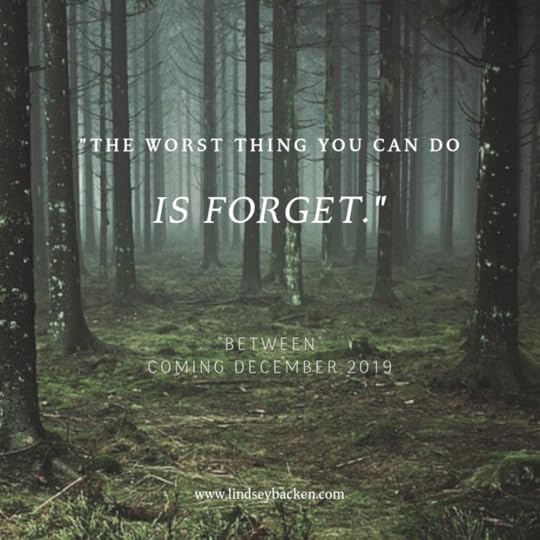
Audio Interview:
Spreaker: https://www.spreaker.com/user/indiebeacon/indie-beacon-radio-show-134-with-lindsey
SoundCloud: https://soundcloud.com/indiebeacon
Video Interview:YouTube: https://youtu.be/C4a8e7a5ui8
Facebook: https://www.facebook.com/Indie-Beacon-Radio-346796469485062
July 2, 2019
How to Automate Your Life
I have a confession: I did nothing for my blog last week. I didn’t email my following friends, I didn’t blog for my readers, and I didn’t write an article for my writer friends. I barely worked on my novel, despite the fact that I am literally in my final read-through before I send it off my friends who have offered to add their strengths to check my storyline.
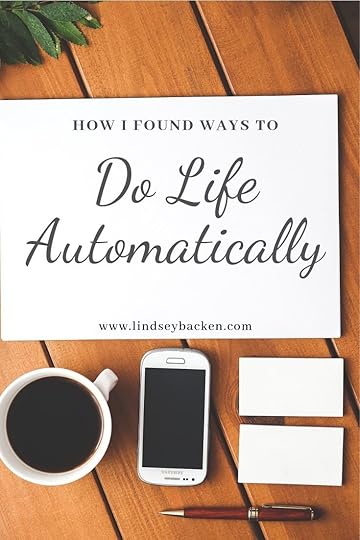
Was I on vacation, you ask? Why, no! I worked my day job, cleaned my house, traveled to visit my sister, ate dinner with friends, fixed my car, paid bills, scolded my cats...In other words, I lived life. Productive, right? Except, I’m still behind. Sounds familiar, doesn’t it?
I have a lot going on and not enough sleep, so I’ve been looking for ways to think less about everyday things and more about what I need to focus on. And though I am sure our lives look very different, there are common things we all have to do and we’re all short on time. So I thought I’d share and see if you have anything you’ve used to add.
Creating My RoutineI know some of you hate routine. It feels restricting, regimented or OCD. But look at it this way: You don’t have to make choices when you’re in a routine. When you have found a routine that works for you and melded it into habits, your brain can do things on autopilot. You save time because you have decided ahead of time when you will do which things and in what order. I am playing with my routine right now, but I know what has worked best in the past.
Using Other People’s RoutinesOne of the things that always seems to be coming out of my mouth is, “And then I’ve got to clean.” In full confession, I have a Cozy Add-On App from FlyLady that I need to work back into a habit. But I have found in the past that Flylady has a good routine. Seriously, this lady has an entire website built around cleaning your house, but she knows her stuff. I have been working on fitting chores back into my routine. She already has things broken down into daily tasks: basics like dishes and a load of laundry. Then she has spliced your house up into zones that you focus on each week. So you do one easy task every day that keeps you on top of your decluttering and deep cleaning without the marathon sessions I am currently using. This is a work in progress for me: I am trying to get my sleeping schedule back to 5:00 mornings where my routine works well, but lately I’ve been getting to bed too late which leaves me just enough time to get ready for work. Anyone out there using FlyLady and want a buddy? Let me know! I need help.
But I love the idea of piggybacking on other people’s systems. FlyLady’s house is probably cleaner than mine. Dave Ramsey’s bank account is definitely larger than mine. These were normal people who struggled, found systems that work, and now excel in them. So I’ve been making things easy on myself. Let’s just do what we know works and then we have the next step. If FlyLady suggests I clear off my dresser today and Dave recommends that I save until I can cover my expenses for 3-6 months, why waste time working out a chore chart and researching investment options so I can make my own plans? Let’s just stick to what has been proven to work and free up the time to finish editing that novel!
Automate Bill PayingThis may be the most common automated service, but it can really help. Assign a day your reoccurring bills will draw from your account. I space them out but put the larger bills a day or two after I know I will get paid. Because I have budgeted for the month, I know exactly how much money I need to leave in the account and what I should pull out for spending. I purchase food, gas, and my fun things out of cash using an envelope system so I know what the money is designated for. I also know how much needs to sit untouched in the account so the payments will go through. And then I don’t do anything except check off the bill as paid.
Automate Common PurchasesI started taking vitamins by Meleleuca and they are shipped to my house every month. It made me wonder what else I could arrange to show up on the doorstep. This is definitely still in the experimental stage, but it has been fun. I am working through Financial Peace University and am currently saving as much as I can, so I have focused on the necessities but I like to purchase directly from individuals or companies when I can. But if I am going to be making emergency runs to the small stores nearby anyway, why not see what I can automate. Here are some of the thing I am trying:
Cat Litter - Yeah, I said it. I wanted to try a new litter I saw anyway after an ongoing battle with keeping cats inside and away from recent animal attacks in my neighborhood. So I tried out Pretty Litter and I have to say so far it has been worth every penny, even if I’m pretending I only have one cat instead of two.
Cat Food - I needed to upgrade from the “Cheap Stuff” and locally sold cat food isn’t cheap at all. So I went to the source and got a percentage off for reoccurring shipping.
Vitamins - Right now I am using the Meleleuca Power Pack but before I had my vitamins from New Chapter which I highly recommend with this referral link.
Groceries - So this one isn’t quite in gear yet (as my refrigerator will attest). I have been eating out a lot lately because I don’t enjoy cooking, especially when I don’t have a lot to work with. I have used meal services in the past but they were expensive. But I also need to be healthy. I don’t want to spend my Sundays grocery shopping, certainly not driving as far as I would need to to have a lot of healthier, harder-to-find things. So I am planning on choosing some recipes and using the “Curbside Pick Up” option of a store about half an hour from me. Sure, I’ll still have to drive, but I won’t have to spend two hours, wandering around trying to think of what I could use to cook something that tastes good.
It’s been fun and I have only scratched the surface of what I could do. As long as these are things I buy every month anyway, why not see how many I can put on standby or even automatic shipping? So that’s where I am at this month. What about you? Do you have any routines, tools, or door-step packages that make your life easier? Please share!
June 21, 2019
Why You Should (or Shouldn’t) Write a Book
You have this story burning inside of you—but it’s a little off-beat, or it strikes really close to home; more specifically those homes of family and friends who may read into things that are or are not there, or maybe it flies in the face of every social article you’ve read lately going directly against the bandwagon. The thought of writing won’t leave you—but it scares you too. You know your reasons for writing the book. I don’t. So how do you decide if a book is worth writing? How do you find the courage to write it? And how do you discover what it is that you really want to write in the first place? Let’s tread, but tread with caution. Don’t worry. I’ll go with you. I’ve been down this path before. Before we go, let’s get one fear out of the way.
You can write this story, however you like, as detailed as you like, and never, ever publish it.
Yup, I said it. Who says you have to share every story you write? (Hint, none of us have. Most of our early stuff isn’t even good enough to publish.) So if you feel like you need to write a story for YOU, that a good thing. Writing will grow you as a person. It will grow you as a writer. Whether you need to prove to yourself that you can actually finish a fictional, fantasy novel because you’ve never finished anything in your life. Whether you have a memory that won’t stop replaying in your head and want to get it onto paper so you can make it stop spinning and actually work through it. Whether you want to write with complete abandonment without worrying about grammar or spelling, just for the sheer joy of telling a story. (See, what I did, with a list of fragmented sentences?) Whatever your reason, the important thing is that you write. No matter if you are using writing as personal therapy, a way to explore a concept you’re curious about, or just to relax and find joy in creating something, it is enough. Likely, every book will include portions of all three. And, by the way, if you change your mind after writing the book and want to share it with a few people or release it into the world, that’s fine too—but you can also leave it in a drawer, on your hard-drive, or delete the entire thing. Writing it for yourself is enough.
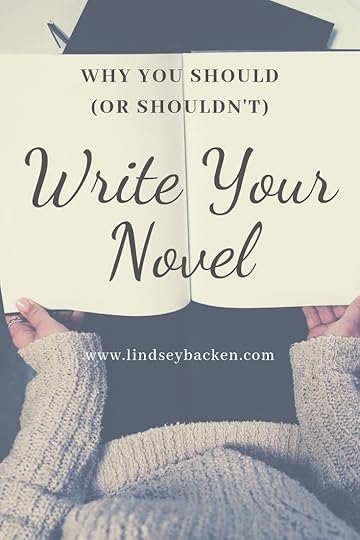
Finding Your Why
Now that you can breathe again, here are the reasons you SHOULD write the book:
Reason One: It’s in your head. It’s been half-written or not even started for years and it’s bugging you, bringing you thoughts of defeat, fear, or discouragement simply because you haven’t finished it and you don’t think you have what it takes.
Why You Should Write It: Because you can! Because you weren’t made to mentally beat yourself up with negative thoughts. Your mind is actually wired for positive thoughts and when you create thought patterns that are negative, you literally cause brain damage.
Reason Two: You're trying to work out your thoughts about an issue that happened to you or a belief at large.
Why You Should: Fictional stories are a great way to explore concepts from a variety of viewpoints and scenarios. By exploring this idea in an actual scenario, you can investigate it as more than an abstract theory and explore how it would be applied to real life. By fictionalizing it, you further free up yourself to look at it from a completely different frame of reference. As your characters learn and grow, so will you. This is how I personally approach the majority of my novels. Use this to explore “what if” concepts. If you choose to explore a question that could bring up negative memories or trauma, writing can be healing but it’s important to work these things with a counselor who can help you navigate deeper issues.
Reason Three:
Because you like to write.
Why You Should: Because, why not? If it gives you joy, write! Don’t worry about spelling or grammar or if you’ve skipped hunks of the narrative. Just write. (But don’t publish!) It’s okay to dash along and get a story onto paper without judging yourself. That is actually the best way to get a draft onto paper. If you want to share it with other people, though, revisit it. I suggest you don’t even consider sharing it until you’re at least in the second draft and have smoothed out the story line and fixed the spelling and grammar to the very best of your abilities. After you get their feedback, you can make further changes and send it off to a professional editor. Then, you can share with the world. But this article is about writing the story for the story’s sake and it’s perfectly fine to write haphazardly when you’re putting a story down for the sheer fun of it. Don’t let that fear keep you from writing.
Reasons You Should Not Write A NovelThere’s really only one reason you should NOT write a novel—even if you want to. Hint: It’s about YOUR motives, not your character’s story. Spending time inside of your story forges thought patterns in your head and creates emotions that both you and a prospective reader will feel. If your story goes somewhere dark, it’s okay as long as the result ends in emotions of conquering the darkness, growing into a healthy place, or acknowledging the wrong. If your motive for writing is to bring awareness to a need and inspiring people to address it, you may have to write some dark scenarios. If your motive is merely to “get revenge” on someone, indulge a fantasy that would have consequences in real life, or imagine and create anything that creates hostile feelings toward yourself or others in either yourself or your reader, don’t write it. Remember, what you focus on will grow, so focus on thoughts that you want to be stronger in your head. Use your writing to explore and forge ideas that will inspire you, empower you, and make you into a better person.
Likely, your reason for writing isn't anything like the above and your fear is something that can and should be overcome. So write that book. Write it for your own enjoyment and growth. Write it to encourage others. Write it to show yourself that you can. And don't forget to enjoy yourself along the way.
June 19, 2019
How to Become The Perfect You
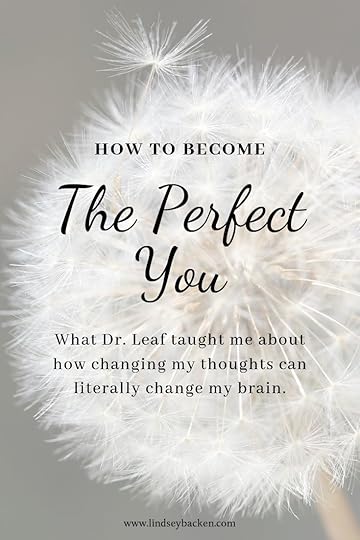
Did you know that your thoughts can physically change your brain? I didn’t until recently when I read “The Perfect You” by Dr. Caroline Leaf.
As neuroscience shows us, every thought you think matters because it changes your brain! (The Perfect You, Page 16)
This ability for the brain to change is called “Neuroplasticity” and it’s something I’ve been learning about through the works of Dr. Caroline Leaf and other neuroscientists who know way more about the brain than I do. So why am I writing about it? Because my life has changed since I took three concepts to heart:
Your thoughts can change your brain.
Your brain and body are naturally geared toward optimism and respond in healthy ways to emotions like love.
Your brain and body respond negatively toward emotions like anger and fear, literally causing brain damage.
This means I can quit trying to decide if I was smart, average, or behind in my childhood intelligence and capabilities because whatever my brain was then, it doesn’t have to stay now. Case in point: I am an author, despite the fact I had terrible handwriting, spelling, and grammar even with intense endeavors to improve all three throughout my school life. It’s changed my emotions too. Do you know how often I’ve had thoughts lately like, “I want to be angry with you but it’s not worth causing brain damage.” Then I move on with my day instead of staying in mental rants over people who have no idea they even made me angry. This also means I can stop feeling inadequate when I run into someone who knows a lot about something I don’t and I can stop judging someone who thinks and acts entirely differently than myself. We’re all different and we’re all supposed to be. We’re not in competition because we’re all unique and we all, as Dr. Leaf says, “Can do something that no one else can do.”
What is the “Perfect You?”I found that as I spoke to people about the book we’re reading in Book Club, the title actually did more to turn people away than to pique their interest. Some people were concerned about the concept of being perfect because “only God is perfect.” Others, I think, shied away at what seemed like an idealistic and perhaps new-age image that sprang into their minds. While not criticizing anyone’s reactions, I feel it’s important to explain what Dr. Leaf means by “Perfect You” before I go any further telling you what I learned from the book. In the book “The Perfect You” is simply your unique way of thinking and the way you are designed to think, speak, and act that is unique to you.
We are “Wired for Love”Research shows that as you think, you influence your genetic expression and build your distinctive interpretation into physical thoughts—thoughts that are different from everyone else’s. (The Perfect You, Page 18)
Love changes the physical nature around all 75-100 trillion cells of our bodies and gives us the courage to face and deal with blocks and locks of our Perfect You. (The Perfect You, Page 25)
This teaching fascinates me as an author because I use fiction to explore (and help the readers explore) concepts that encourage and inspire growth, overcome trauma, and contribute to peoples’ lives. Dr. Leaf’s teaching implies that the pull toward our “Perfect You” is more powerful than the damaging thoughts and experiences we have, which means when you tear down and rebuild unhealthy patterns, even ones that have been deeply wired into your brain. If that doesn’t give a person hope, I don’t know what will. It is not too late for you to change.
When you think, feel, and choose you are updating your experience, and this is reflected in structural and functional changes in your brain: you are both literally and figuratively building memories. (The Perfect You, Page 27)
One article is not enough to explain in-depth the concepts of the book and I’m still learning this for myself, so if any of this has piqued your interest, please go read about it from the woman who knows. But here’s the thought I want to leave you with today: Your thoughts literally change you and you get to choose which thoughts you think. So think good thoughts, my friend, and take a moment to imagine what you really want to become. Because you can learn, grow, and change.
June 14, 2019
Taming Your Story Line

If you’re anything like me, you’ve had that moment when your story line grows and romps right out of the neat little patterns you had in your head. I’ve tried everything from 15 page outlines, to plotting software, to notecards. They work—for a while. But how do you see your novel at a glance without losing track of all the details you need to remember? The best way I have found is through creating a literal “story line” using sticky notes and string.
Here’s what you’ll need:
Sticky notes
Pen or Pencil
String (optional)
Clips (optional)
Step One: Define Your Main Plot
Sticky notes are a writer’s best friend. They only allow a bare-bones plot, keeping you focused on the main points of each chapter. But you can add notes behind your main plot to track all the little details you want to include without getting overwhelmed. Sticky notes also give you a way to see your entire plot at once so you can check for pacing issues and gaps. Write the basic plot points onto the card, allowing each card to represent an entire chapter. Don’t worry about details or subplots right now—just list the basic sequence of events that your main character will be experiencing. It should look something like this:
Character A: Beginning, conflict, build, climax, conclusion.You can have as many cards as you need but try to simplify the outline as much as you can. The cards are to jog your memory, not dictate the entire developed story. Now, do you have a second main character? A sidekick with a subplot. If any other character will have chapters from their point of view or has a secondary plot woven in, create a second row, keeping the plots next to the character they concern. So now your outline should look roughly like this:
Character A: Story NotesCharacter B: Story NotesStep Two: Check for Pacing and Plot Holes
Are there any major chapters missing? Does your main character have more chapters than the others, and if so, is this what you intended? Once you’ve seen your squares lined up, are there more events than the total amount of chapters you’re comfortable writing? If so, don’t panic. Look for events you can combine into an existing chapter. If you still have too many, look for story bits that repeat concepts. If your character is training with a friend in one chapter and talking with the same friend in another, can he have a conversation #1 and action #2 in the same session? Are there any events you are including so you can reveal a small, but important plot point? If so, can you work that bit into an existing chapter without writing an entire chapter around it? Or are there too few chapters? You will probably add some as you write and discover plots you want to develop but if it concerns you, consider which subplots you can include. Remember, you can have as few or many chapters as you want, but this structure check will help you see if your story will run out of steam or if your saga will run away with you and turn into a fifty-chapter dragon. (Guilty.)
Step Three: Plan Your Outline
After creating separate rows for each of your story lines and subplots, combine the story into its proper order.
Now that you know the events, it’s time to arrange them into your story’s order. Put your notes in the order they happen and pay attention to the character’s viewpoint. You can even have different colors sticky notes if you’re writing from multiple points of view.
Do they flow well from one to the other or does the pattern seem like it will jar your reader? If so, check for chapters you could write from a different viewpoint without marring the flow or ruining your plot. Don’t stress over this point. It’s all right if your main character has more chapters, just look for clumps that feel concerning.
Step Four: Step Back
Seriously. Get a glass of water or refill your teacup. Now think out your story while following your notes. Your plot line may change as you write—that’s normal and just fine. Often writers feel like over-plotting ruins their flow, though others prefer to outline each chapter detail before they start their draft. I tend to outline more during my revision stage when I know what story I’m trying to tell. I personally use my story line as a reminder of what I want to write, not as a set of rules, and I revise it as characters reveal more of their stories. Let your brain work however it best processes, but use this moment to check in with yourself. Does this outline feel right?
Step Five: Add the Things You Can’t Forget
Now is the time to think of smaller details you want to make sure are included in your book. Are there clues, background details, or important items you need to incorporate? Write on separate sticky notes and put them behind the note for the chapter you want to include them in. You can place smaller stick notes in front if you want to see them all at once, but it will quickly clutter your board. If you place all the detail notes behind the chapter notes, you can take down the clump as you write your chapter or summarize your outline so you’ll know everything you want to include—but won’t feel overwhelmed looking at your basic plot.
Step Six: Write Your Novel
Keep your notes on a physical line, clipping them together if you want to see the entire story line at a glance. Or you can use them now to write your outline in Scrivener or whatever system you use. If you have 20 or fewer chapters, consider purchasing my Journal for Writers. It’s called “Act Like a Writer” and will guide you in creating character-driven novels by tracking your writing, developing characters, and creating locations. (Sorry, epic fans with 20+ chapters. Your version isn’t out yet, though it won’t be forgotten, because I need it too. If you’re really raring to get started, send me a note about getting the PDF copy and you can print out as many chapters and character sheets as you need.)
Are you feeling better about your story? Writing is scary, I know. It takes courage and perseverance, but now when you sit down, you will know what goes on to that blank page and why it’s important to your story. Now you’ve just got to take a deep breath, remember that every word you pen will make you into a better writer, and give yourself permission to write. I believe in you. Now come on. Let’s quit procrastinating and go write.
P. S. Did you know that I have a video class on how to outline on Skillshare? If you’d like to watch it, you can get two months for free by using my affiliate link. You may cancel at any time.
February 7, 2019
Beyond Failure
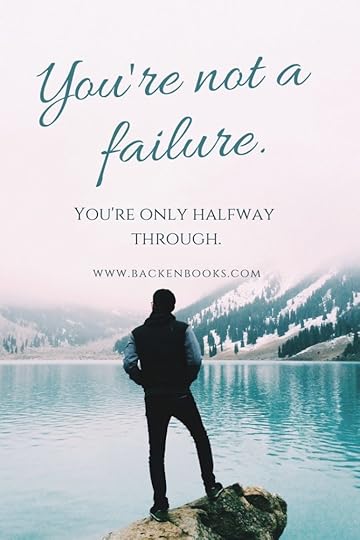 “You’re not a failure. You’re only halfway through.”
“You’re not a failure. You’re only halfway through.”Dear Friend,
Dreams are funny things. They’re like fairy wishes: they come, but never in the way you expect. They’re sneaky. You have to work for them and often you do–hard–and the next year, you’re only half as far as you wanted to be. It was harder than you thought. You had glitches, life came along with trials, you ran out of manpower and money. You failed.
At least, you think you did.
You tell your brain it just wasn’t smart enough; you tell your dream it was too big, too unrealistic. You get sick, either wearing yourself out with frenzied action, slumping in front of your favorite distraction with comfort food, or taking that soul-killing job because bills happen.
But you can’t quite forget the dream.
It’s part of you, infused in you. It can’t die because it’s inside of you and you’re still alive and kicking. You either kick in anger or you kick ass and keep working at it in spurts of determination, feeble efforts in secret, or even guilty daydreams where you imagine all the things you should be doing while you’re not doing them. You might even try something unrelated; you act in a local theater instead of shooting for Broadway; you write articles instead of your fictional story; you design spreadsheets instead of art. It’s not your ideal, but it’s something. You see it as a compromise, a defeat, but it’s not. You’re still doing that thing you were meant to do. You are acting, you are writing, you are creating even though your outlet isn’t what you wanted. You know why? Because you were created to do this thing.
You want to know the strangest thing I’ve discovered about my dreams? I never failed–I simply didn’t give them enough time. I created vision boards for the last few years and I’ve rarely accomplished I set out to do at the beginning of the year, but the things that were really important from a board four years ago? Oh, hey! I’m doing that. And I didn’t even realize I’d reach that goal because it looks so different than what I had envisioned.
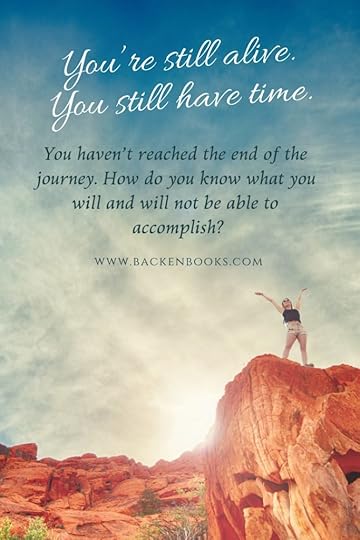 You’re still alive, you still have time. You haven’t reached the end of the journey. How do you know what you will and will not be able to accomplish?
You’re still alive, you still have time. You haven’t reached the end of the journey. How do you know what you will and will not be able to accomplish?Dreams are journeys. You can’t microwave them, and you can’t take the plane. If you seed hasn’t broken through the soil, don’t stop watering it and walk away. It hasn’t failed and neither have you. It’s never too late. That twinge you’re feeling? That’s the seed asking for water – it’s plenty busy down there. Water it, friend, even if you can only manage a few drops. Do the best you can with the life you have and a few years from now, you’ll be going along a normal day and you will realize “I’m doing it!”
It’s exactly what you wanted to do – and nothing like you thought it would be. But don’t despair – it’s only a step. If you want to write, write. If you want to create, create. If you want to discover, read and learn. You’re still alive, you still have time. You can’t declare yourself a failure because you haven’t reached the end of the journey. How do you know what you will and will not be able to accomplish?
I believe in you.
Lindsey
January 7, 2019
How Small Choices Make Big Changes
It’s 2019, and everyone is making changes and new starts – except me. But you know what? We don’t have to make new starts or set large goals to improve our lives. We don’t have to buy new things or clean out all the old projects from our desks. (Guilty!) It’s fun to set new goals for the new year or think of themes and if it works for you – go for it. But what about those of us who are smack dab in the middle of our lives with no room for adding any other focuses? Are we destined to a bleak year where we will be no better in December than we were in January?
No. Here’s why.
It’s my first blog post for 2019. (Quick! Think of something that sounds impressive!) I intended to write about my goals for 2019 like every other writer in the blogging universe. But my only goal is to keep doing what I’m already doing.
It’s hard to make any new starts when you’re smack dab in the middle of your projects. I’m about 3/4ths of the way through writing my 7-Book Sentarra Series. I’m 1/2 through working through the Elite Blogging Academy for my website Stage to Page. (Keep your eyes out, I’ve turned my eyes onto Backen Books, so there will be changes around here.)
In fact, the only new thing I’m learning is how to get around the glitches in the latest version of Adobe Elements so I can deliver fully edited videos from the Drone Company I’m working with now.
So now that you know more than you wanted to about where Lindsey Backen is starting 2019, we’ll look at what’s more important – where are YOU starting 2019 – or where are you starting TODAY?
We can start any day with anything – even a tiny thing. Maybe you were stiff and achy yesterday, so you stretch while you’re looking for excuses to stay in bed a little longer this morning. Perhaps you drink only one cup of coffee or soda instead of three. Or you say a kind word to the family member or friend you would normally just stay on neutral terms as you interact.
Even if you only do one thing today for yourself or someone else, and something else tomorrow, you will still be twice as better on day three as you were on day one. Little choices always add up and gain momentum. Remember, life is all about progress, not perfection. Beginnings are grand and exciting, but it’s the putting of one foot in front of the other for a very long time that gets you to the end of the race.
So join me, will you? Right here in the middle of our normal lives. We won’t jump through any impressive hoops. (Who’s watching anyway?) We won’t sprint ahead, only to collapse out of breath because we pushed too hard, too soon. We’ll just continue on, making simple choices that result in each step being a little better than our last.



